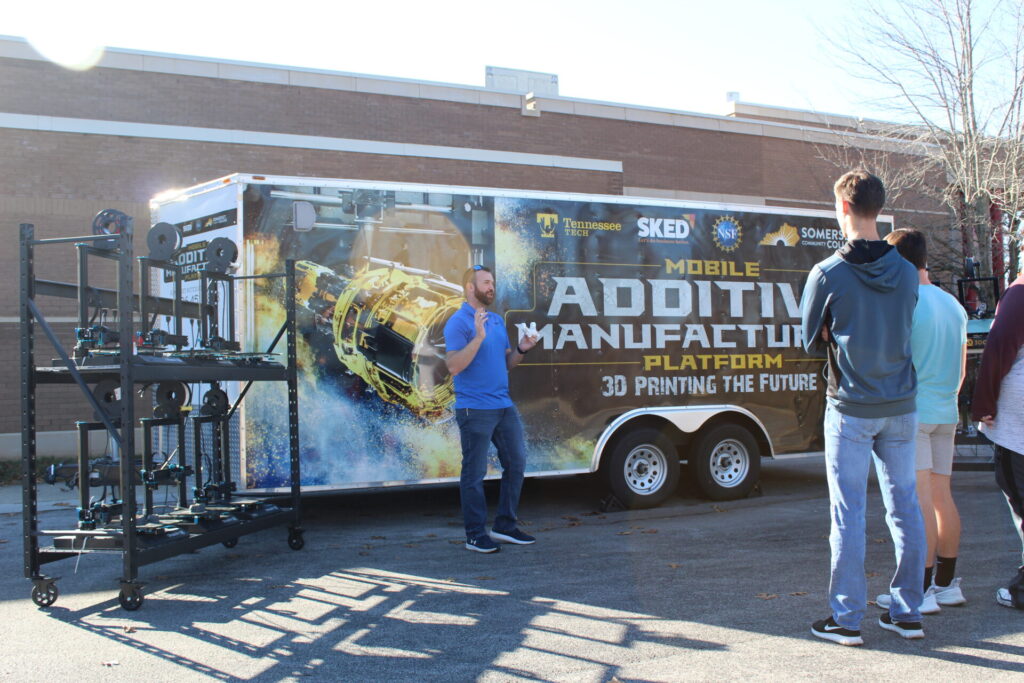Somerset Community College (SCC) is uplifting its local community in rural Kentucky, empowering women in the workforce and creating opportunities for marginalized groups. SCC is pushing the boundaries of what a technical education could look like, broadening its impact by bringing additive manufacturing to everyone regardless of their gender, socioeconomic positioning, or background. This year, SCC, a public community college, was given a USDA Rural Development grant to fund a program fostering additive manufacturing for businesses that employ individuals from disadvantaged areas in the state.
SCC is part of the Kentucky Community and Technical College System (KCTCS) and offers a technical education for a wide variety of student specializations. However, it’s their Additive Manufacturing Center that stands out, using a forward-thinking curriculum with next-generation technology like generative design and foundational skill-building in 3D printing—creating a thoughtful bridge between design education and manufacturing education.
Elevating Kentucky through Additive Manufacturing

Through the Elevate Kentucky through Additive Manufacturing initiative, SCC is using its grant to bring training, equipment, and learning support to organizations such as Refuge for Women and Red Bird Mission in rural Kentucky.
Refuge for Women is a nonprofit organization in Kentucky that provides support for women who have been victims of human trafficking or sexual exploitation. The organization offers up to 12 months of housing and trauma-informed care to residents in the community. Refuge for Women’s works to help individuals live a life of purpose and freedom through projects such as Survivormade, a social enterprise where women can gain employable skills through the sale of artisanal crafts.
Similarly, Red Bird Mission provides support to communities in rural Kentucky through education, health and wellness, community outreach, economic opportunity, and community housing. It is a Christian organization founded in 1921 serving community needs that now also works with local artisans who sell their goods throughout the US.
Through SCC’s program that upskills local artisans with technical and business expertise, participants in these organizations can expand their skills. Many of these local businesses focus on artisanal crafts, which is a good match for learning manufacturing methods—things like leather goods, sewing, and machinery can be significantly improved in terms of speed and manufacturing complexity.
SCC also plans to teach 3D printing techniques, opening up the potential for new product lines to the local community with very little upfront investment needed. For example, a typical clay mold or piece of artwork can be scanned and replicated using 3D printing technology, ultimately benefiting the artisan’s backend process.
“We often see a great deal of news about how advanced manufacturing is being used by the big industries, but it is important for us not to forget that this is also a technology for everyone, and from every walk of life,” says Eric Wooldridge, Director of the SCC Additive Manufacturing Center, and the leader for the project. “Sure, it certainly has the power to transform rockets and cars, but it also has the power to transform the life of a single, unique individual. To give someone that literally has nothing not just a chance at a brand-new career, but an opportunity to seize an idea or a dream and make it into a reality. That is the type of work that brings real meaning to what we do.”
Making Advanced Manufacturing Accessible
Wooldridge at SCC and his team will be training people remotely to use manufacturing hardware and software. Using Autodesk Fusion 360, students will learn via tutorials for modeling, design challenges, and skill-building assignments. The curriculum progresses from basic modeling to modeling advanced forms and shapes, where students are encouraged to take risks, make mistakes, and learn by doing to improving their craft. Ultimately, the team at SCC wants to give students the tools and skills necessary to build a business, leveraging the curriculum to identify and create new product designs.
“One of the biggest barriers to the human race has always been unequal access to advanced technology,” says Wooldridge. “It stifles innovation and the potential to advance beyond many of the problems that plague our world. Our mission at the Additive Manufacturing Center has always been to counter this inequity by creating ways for advanced technology such as additive manufacturing to be accessed at a low-cost. This project truly embodies the focus of our hearts, as it has the potential to impact the futures of our participants and the lives of those around them. Providing people—who are accustomed to hardships and have little to no resources—with advanced technology that can literally make whatever they imagine. And we are excited to see, and hold in our hands, all of the ideas and innovations they can imagine.”